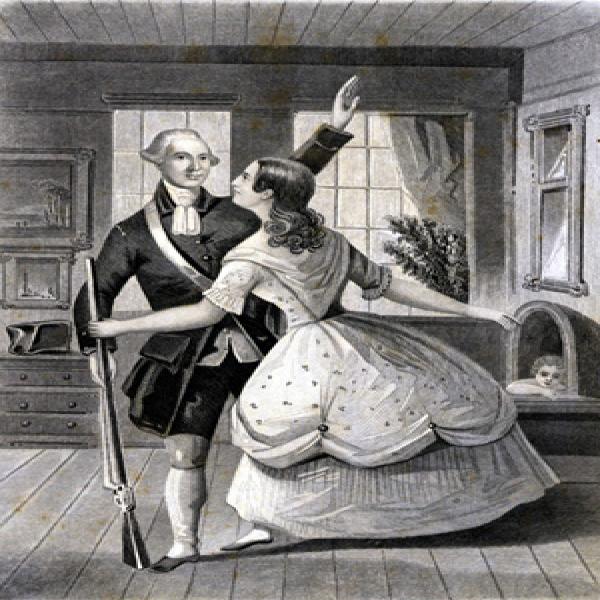Gen'l Warren taking leave of his wife and child on the eve of the battle of Bunker Hill
Original

Background Notes
Joseph Warren (1741-75) was a very popular and charismatic doctor, orator, and author in Boston in the years before the American Revolution. Tall and handsome, he was known to generously give of his considerable skills as a physician to heal the poor free of charge. He played a key leadership role in the resistance to British authority along with John Hancock, James Otis, and Samuel Adams. His friendship with Paul Revere did much to unite all social classes in the struggle for independence. He was a skilled propagandist, often writing for the Boston Gazette and creating pamphlets and speeches. He was a member of the Boston Committee of Correspondence, the Massachusetts Committee of Safety, and helped draft the "Suffolk Resolves." His oratory reached its zenith in a speech he delivered on the fifth anniversary of the Boston Massacre. When fighting finally broke out, he treated the wounded at Lexington and worked diligently to create a provisional army and to rally the cause for independence throughout the colonies.
On June 14, 1775, Warren was elected a major general of the provincial army. Despite his rank, he volunteered to fight as a common soldier in the Battle of Bunker Hill. During that battle, on the third and final assault on the American redoubt, Warren led the fight out of the redoubt. Lacking ammunition, Warren and three others fought off the advancing regulars with rocks, sticks, and fists. Turning to shout to his retreating comrades, Warren was killed instantly by a shot to the head. Warren was soon immortalized as the first great martyr to the cause of American independence. Abigail Adams, who along with thousands of other Bostonians witnessed the battle from the city, expressed the sentiments of many when she wrote to her husband: "I have just heard that our dear Friend Dr. Warren is no more but fell gloriously fighting for his Country — saying better to die honourably in the field than ignominiously hang upon the Gallows. Great is our Loss." (2)
Joseph Warren married Elizabeth Hooton (1746-73) in 1764. Together they had four children: Joseph, Elizabeth, Richard, and Mary. After his wife passed away in 1773, Warren sent his four children to live with his mother in Roxbury. Eventually, he became engaged to Mercy Scollay, who after his death took care of his youngest children, Richard and Mary. (3)
Clearly then, Warren is not taking leave of his wife in this sentimental portrait that first appeared in the Columbian Magazine. The engraver is Thomas Kelley (1795-1841), who was born in Ireland and died a pauper in Philadelphia. Although we know little of Kelley's career, we do know he worked as an engraver in Boston, Philadelphia, and New York City from 1823 through 1835. (4)
This image is one of the many examples of how Warren's celebrated life and heroic death were used to unite and inspire the young nation. The image is very romantic, with the stalwart Warren holding his rifle while the woman pleads for him to stay, pointing to the adorable child peeking over the edge of the crib. This image illustrates the honorable Doctor Warren's choice of duty to his country and the ideal of freedom over his own personal happiness.
1. American National Biography, s.v. "Joseph Warren." (NY: Oxford, 1999).
2. Adams, Abigail. Letters of John Adams and of Mrs. Adams.
(Boston:
Little, Brown, 1841) vol. (2) p. 53.
3. Fleming, Thomas J., Now We Are Enemies: The Story of Bunker
Hill. (New York: 1960) p. 61.
4. Stauffer, David McNeely. American Engravers Upon Copper and
Steel. (New York: Grolier Club, 1907), 149.